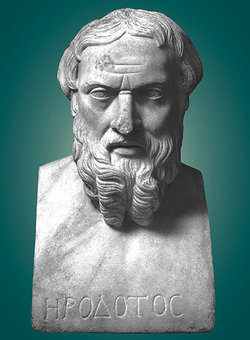
 |
Herodotus: Histories |
|
| Ancient Greek text and translations presented by the Classics Reader |
| Please note: The above is
only an image. Click on it to move to the page in which you can interact
with the program Classics Reader. |
 Herodotus (credit: encycl. Biocrawler) |
Herodotus is the author of The Histories. The word “history” meant simply “inquiry” in ancient Greek, and if it acquired its present meaning it is because of Herodotus, the “Father of History”, as Cicero called him. He was born ca. 484 BC in Halicarnassus of Asia Minor (present day Turkey). At a young age, while still in Halicarnassus, he participated in an unsuccessful attempt to overthrow the local tyrant Lýgdamis, and for this he was exiled. While in exile, he traveled to many places, including the Persian Empire, Egypt, and southern Italy. In Greece he must have lived for some time on the island of Samos (birthplace of Pythagoras), and in Athens. Since he was not Athenian-born, however, he could not become an Athenian citizen with full rights. So when Athens scheduled a colonization of southern Italy at Thurii in 444 BC, Herodotus went ahead and participated in it, thus leaving Athens. He probably died in Italy, ca. 425 BC. The truthfulness of Herodotus’s work has been questioned since antiquity. However, archaeological and anthropological discoveries in the 20th century have largely restored his authority and veracity. Herodotus often presents a number of different opinions and local legends on an issue, and then proceeds to state his own view and the reasons he supports it. The unsuccessful expeditions of the Persians to occupy Greece, first under king Darius I, and ten years later under king Xerxes I, occupy the center stage of his Histories. |
|
Because Western thought has been fundamentally based on principles that first emerged in ancient Greece (e.g., rationality, questioning of authority, freedom from superstition, objective examination of nature, equality of people, etc.), and since such principles took form and crystallized in Greece primarily in the “classical times” (the century that followed the failed Persian invasion), it is not unreasonable to surmise that the Western European civilization might have taken a different course, had the Persians succeeded back in the 5th C. BC. In particular, one wonders what the Enlightenment in the 17th-18th C. would be without its classical roots: would the same principles be discovered then, all of a sudden? Would science be the same without the influence of its ancient Greek heritage? All these are interesting questions that motivate people to acquire a more intimate knowledge of the events that Herodotus describes in his Histories. The following is a depiction of the Mediterranean world as imagined by ancient Greeks at Herodotus’s time, who knew of the places shown below only through the travels and second- or third-hand story-telling of people:
Map of landmark places and peoples mentioned in The Histories (from the Wikipedia, original here) The author of the present web-page has translated a small part of Herodotus’ Histories into English and Modern Greek; specifically, most of Book 1 (Clio). The translation can be found in the program Classics Reader (downloadable and installable in Windows). |
For comments, suggestions, or other correspondence please contact the author of this page. Click here to email to him.